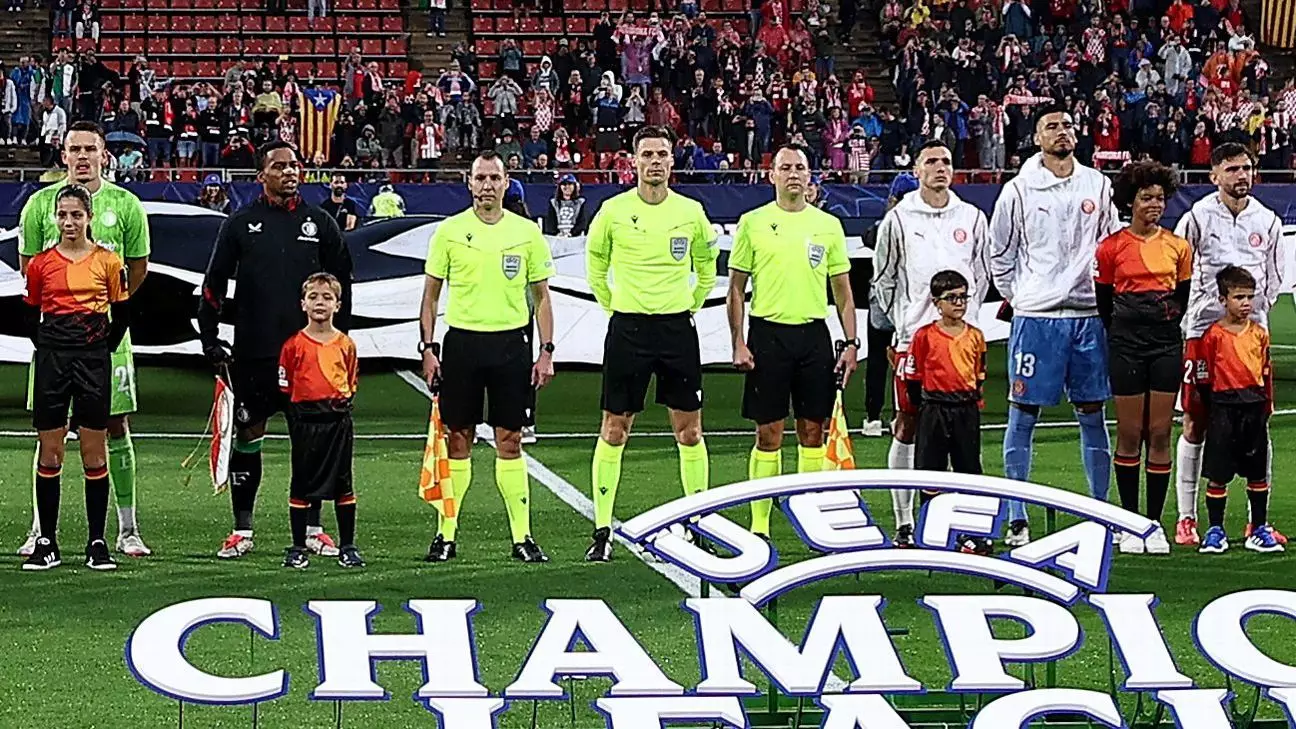In the realm of football, few spectacles capture the fans’ attention quite like the UEFA Champions League, renowned for its high-stakes matches and unpredictable twists. One noteworthy game unfolded recently between Girona and Feyenoord, leaving spectators on the edge of their seats. The clash saw a startling scoreline of 3-2 in favor of the Dutch team, punctuated by a series of baffling occurrences—a blend of two own goals, missed penalties, and even a disallowed goal—which amplified the chaos surrounding the match.
The significance of this game extended beyond just the score. It showcased an extraordinary officiating team, comprised of identical twins Benjamin and Marco Zürcher, who served as assistant referees. Their contribution was vital in navigating the complexities of this match at Girona’s rain-soaked Montilivi stadium. Notably, their presence added a unique flair to the proceedings, drawing attention to their efficient coordination and intimate understanding of each other’s movements on the field.
The narrative of the match was marked by wild oscillations as Girona surged ahead early only to be undone by a series of bizarre events. The unexpected spectacle of two own goals from Girona further fueled Feyenoord’s charge, while a well-deserved Girona goal was disallowed due to a marginal offside decision involving the VAR system—a decision that ultimately stood firm despite protests from both players and fans alike. The latter part of the match retained its tension as both teams traded missed penalties, adding layers of frustration and possibility.
As the tilt approached its conclusion, the atmosphere intensified. Girona defender Ladislav Krejcí inadvertently turned the tide in Feyenoord’s favor with a late own goal, sealing a victory that felt almost surreal. Yet, the drama hardly ended there, as a last-minute penalty claim for Girona was brushed aside, leading to a drawn-out deliberation among the officiating team before the final whistle ultimately blew. This extraordinary match set the stage for an unforgettable reminiscence of chaos, skill, and human error—elements that embody the unpredictable spirit of football.
Despite the exhilarating high and low points of the match, perhaps the most intriguing aspect was the role of the Zürcher brothers in officiating the contest. Football has seen famous sibling duos grace the pitch, but the narrative shifts when you place the identical twin referees in the spotlight. Their seamless synchronization while officiating added a unique dynamic that caught the attention of fans worldwide—an unspoken bond allowing for an efficiency in decision-making that only siblings can possess.
In the realm of refereeing, where pressure is a constant companion, having such a deep-rooted understanding allows for rapid, intuitive decision-making. Both Benjamin and Marco, approaching their 40s, epitomize a long-lasting partnership visible in their professional demeanor. Given their extensive experience together—spanning across leagues and international fixtures—each match becomes an interplay, not just of the players but of the referees as well, bringing an added layer of excitement to the beautiful game.
The Zürcher brothers might just be the latest additions to a rich legacy of sibling duos in football. From the legendary De Boer brothers who forged a path through high-profile clubs like Ajax and Barcelona to contemporary figures like Megan Rapinoe and her twin sister Rachael, the sport is littered with examples of familial influence.
Consider the case of the Altintop brothers from Turkey: both attaining respectable careers in the national team while playing at top clubs. Their story meshes with that of the Wallaces, who made history as the first set of twins to play in the Premier League way back in the early 1990s—a merging of talent that resonates throughout football history. These legacies embody the interconnectedness of familial bonds with the beautiful game, illuminating the paths of both male and female footballers across generations.
The match between Girona and Feyenoord is more than just a scoreline buried in the annals of UEFA records—it illuminates a deeper fabric woven into football history: the intertwining tales of remarkable performances and the involvement of familial bonds that shape the sport. Whether through the prism of a sibling duo refereeing together or legendary partnerships on the field, the essence of football thrives on complexity, history, and the beautiful bonding elements that make every match a potential classic.
As fans continue to embrace the theater of football, it’s essential to celebrate not only the athletic talent on display but also the myriad stories that unfold beyond the pitch. The presence of the Zürcher twins proves that extraordinary narratives can arise in unexpected places, affirming that football reaches far and wide, touching lives and creating legacies that resonate across borders and decades. Thus, the most magical aspects of football go beyond the game itself—they encompass the shared experiences of those who dedicate their lives to its pursuit.

Leave a Reply